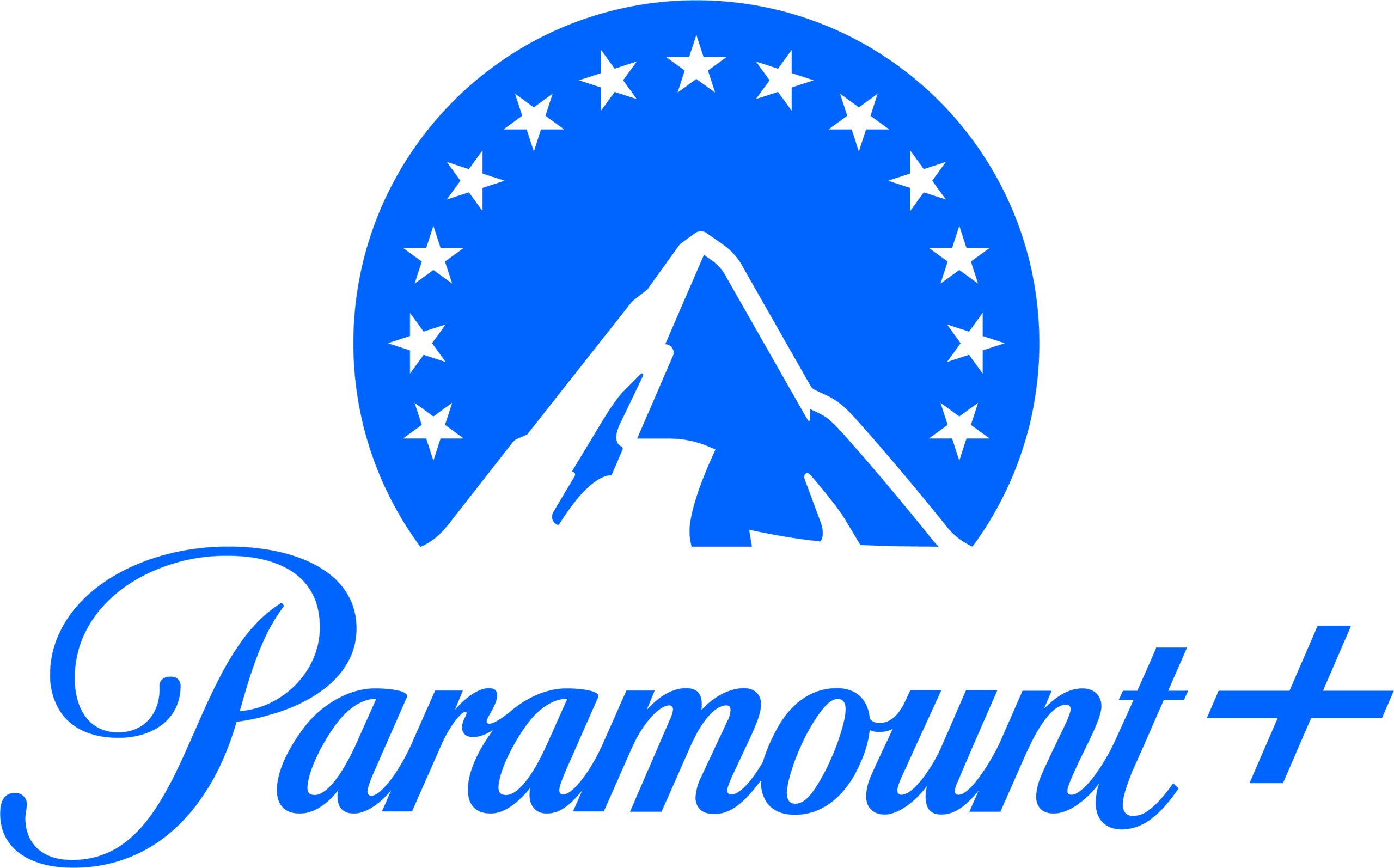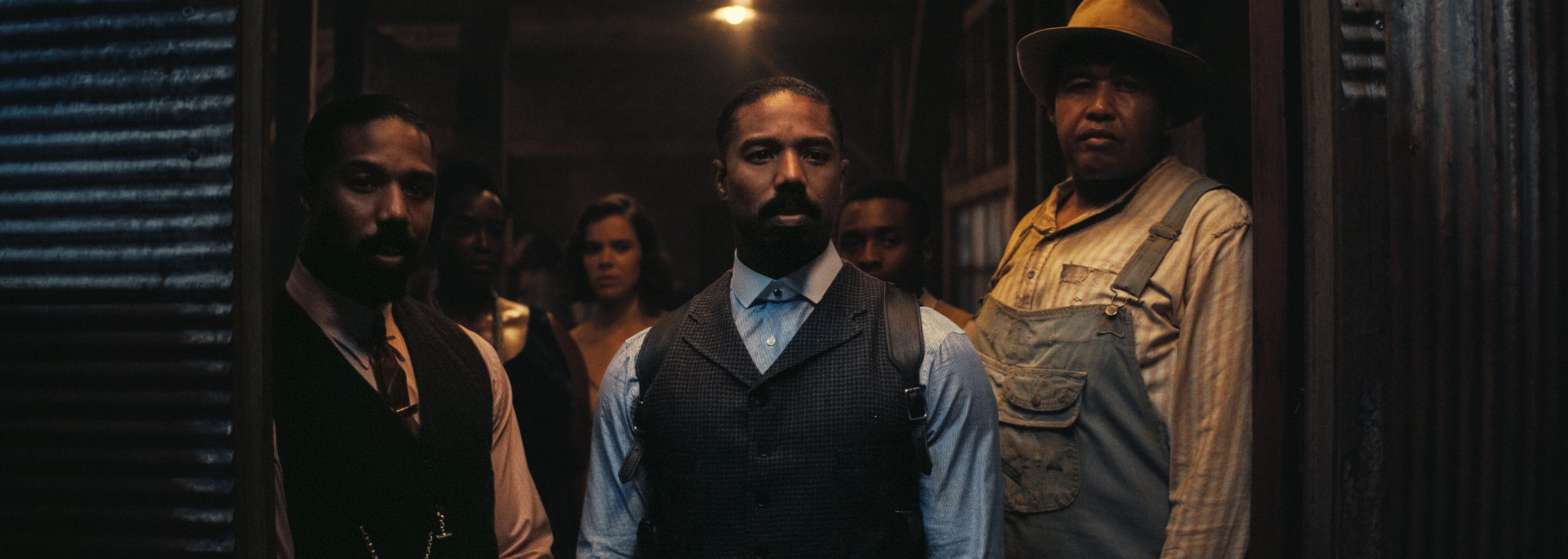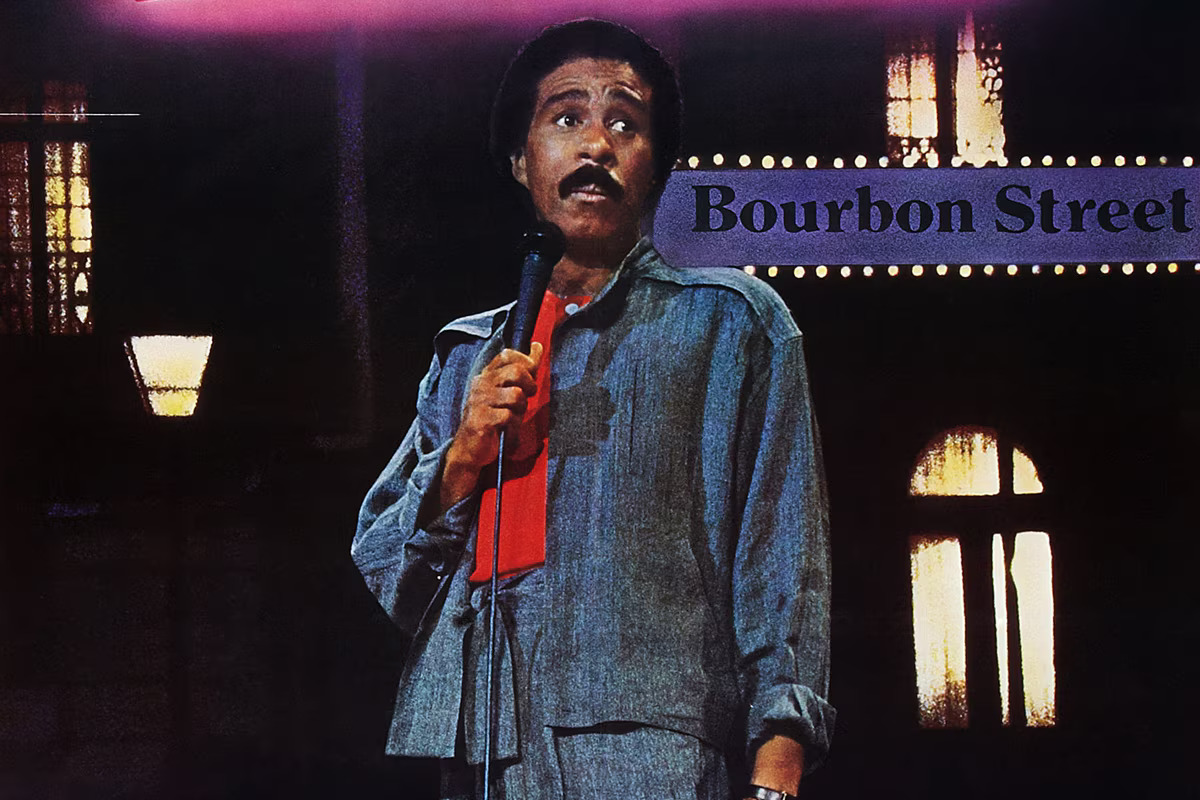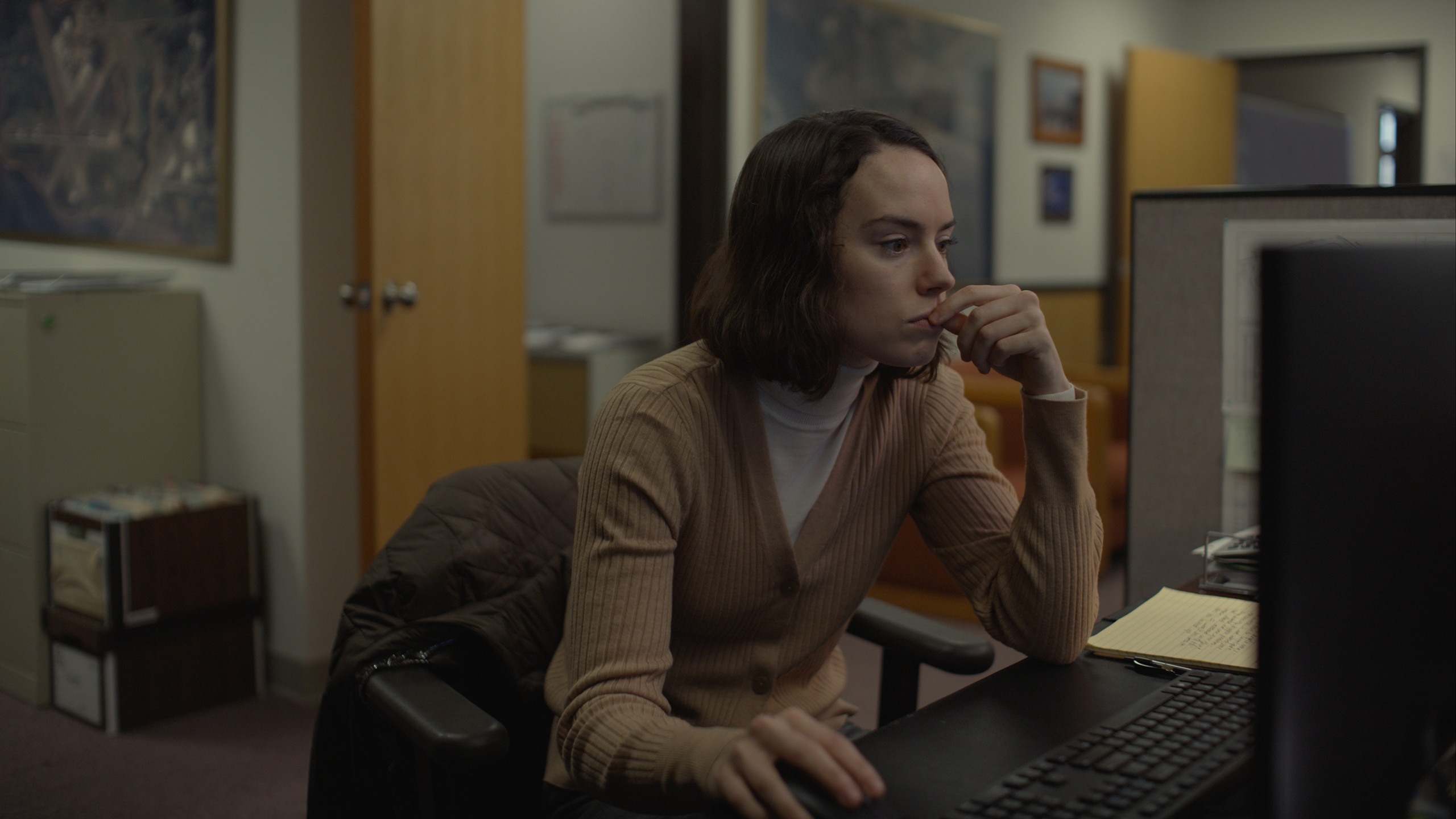
Rachel Lambert spoke with Solzy at the Movies in mid-January about the newly released film, Sometimes I Think About Dying.
Lambert never watched Stefanie Abel Horowitz‘s 2019 Sundance-premiering short film. This was an intentional decision so as to not be influenced by previous choices. Screenwriters Kevin Armento, Horowitz, and Katy Wright-Mead gave Lambert free rein upon coming on board.
Daisy Ridley leads a cast that includes Dave Merheje, Parvesh Cheena, Marcia Debonis, Meg Stalter, and Brittany O’Grady. Oscilloscope Laboratories will release the film in New York and Los Angeles on January 26, 2024. San Francisco, Boston, Portland, and Washington, DC will follow on February 2.
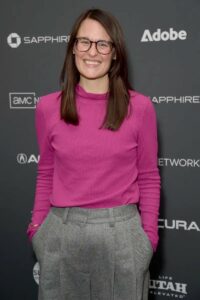
It’s so nice to meet you today. How are you doing?
Rachel Lambert: I’m doing well. How are you?
I am doing well. Thankfully, the blizzard conditions have not started here in Chicago.
Rachel Lambert: Oh, oh, OH, okay. But it’s coming. It’s incoming?
Yeah, it’s coming. They’re expecting like six to nine inches this weekend.
Rachel Lambert: Oh dear. Well, I hope you’re you stay safe and sound.
Yeah, I’m gonna do my best. It’s nice to chat with another Louisville native.
Rachel Lambert: You’re from Louisville?!?
Born and raised.
Rachel Lambert: Where’d you go to high school?
Ballard.
Rachel Lambert: You went to Ballard. The women in my family went to Presentation. You know that now. Anybody who’s not from Louisville will not understand the conversation we just had.
It’s funny. Last year, there was another film at Sundance that was shot in and around the Louisville area. It was one that I was watching virtually from the Airbnb and as soon as I saw the skyline, I’m pausing it, taking a photo—not that I’m putting it out photo online anywhere!
Rachel Lambert: (Laughs), Well, Jeff Nichols did get—I think—at least one bridge shot for The Bikeriders because Danny Lyon famously followed the bikeriders clubs in Louisville and Chicago. I’m pretty sure I asked him a couple times if he was going to. I wonder if that slipped in as pressure.
Hopefully, no one’s going the wrong way on the bridge like Bill Murray in Stripes.
Rachel Lambert: (Laughs) Right. This is great. I’m so glad you’re from Louisville.
Yeah. Was there a film or something that sparked your interest in becoming a filmmaker?
Rachel Lambert: I have been obsessed and watching films since before I could read. I think I learned how to read films before I learned how to read the English language. There are a few in my early years that really captured me. I went through three or four video cassette tapes of Mary Poppins because I wouldn’t stop watching it obsessively as well as An American Tail. I had two or three cinema experiences of the child that really—again, this before I could read. One was I went to the July 1987 reissue theatrical expansion of Snow White when they did that restoration of the print. To have the song in this film is sort of wild to me because that was the first film I saw in a theater. In fall of 89 or 90 in Montreal, I saw Fantasia when they reissued that. I saw Buster Keaton’s Steamboat Bill Jr. I think that all of those films together probably make up the sort of cornerstone of my mind with film. But then, I guess, with that being said, the first film that made me start to take cinema seriously enough to make my own was The Godfather because I’ve seen the American novel on screen and I just had never seen anything like that before.
Yeah. I’d say Showcase Cinemas was pivotal in two moments in my life.
Rachel Lambert: Oh, yeah. What was it?
Well, The Land Before Time was the first film I saw on the big screen and then few years later, another Amblin film, Jurassic Park.
Rachel Lambert: Right. That was a big one. That was a big one. (Laughs) It captured all of our imaginations growing up, didn’t it? (Moves laptop to display the Jurassic Park poster on the wall) Perfect. You’re like that. Well done.
Would you ever want to make a film back home if the opportunity presented itself?
Rachel Lambert: I already have. I made a film called In the Radiant City that premiered at TIFF in 2016 and then was released in 2017. I shot that in and around Louisville. There’s a couple of scenes that we went up to New Albany over the bridge and then there’s a couple that we did that’s just south of town on the highway there. There’s a couple scenes where we shot a barn burning but we had to go down to like Loretto for that because there was really nowhere that would be in the metro area that we could burn a barn and film it. We filmed in my grandma’s house. That’s how personal it got. My family is also from Loretto so that felt personal. It was exciting, but also nerve wracking to bring people there but I think Louisville is incredibly cinematic with all the rivers and it’s such a unique culture to it. Things don’t really change there, which is frustrating as a resident, but in terms of cinema, it makes for great images.
Actually, this is the first time I’ve made a feature-length film that I didn’t make in the south and that was daunting for me. Even my partners—my editor, DP, and composer—we’re all from the south and we all kind of met each other in that world. Making this film in Oregon, in a place that none of us were super familiar with, having mostly made our stories where we’re from, it was a really tall order. I really took seriously the harvesting of—I always care about a sense of place but there was certainly a lot of pressure inside of having to crank it a little bit harder in terms of the investment in the search and the seeking so I can make sure I was getting the right sense of place.
How familiar were you with the short film when you first got hold of the script?
Rachel Lambert: I wasn’t familiar with it at all and then I loved the script so much and I wanted to make it so immediately that I made a decision to not watch it. So that way, none of the choices that Stefanie made would influence me. I respected her enough and her work enough that I was like, okay, if I’m going to represent this film is mine and having my choices, I really wanted to feel confident about that. I didn’t want to, at any point, suspect within that I might have been influenced by someone else’s choices. I just felt like that wasn’t fair or respectful to do that so I abstained. I had such a sense from the script, the diligence of the script, and the personalities of the people that I met who wrote that script that I did have a sense of just the investment that they obviously had made and the integrity of their work. They were incredibly inviting. The script itself was an invitation. There was no visual data. It was written like a play. They’re in a room and they’re talking. I even asked what kind of work do they do and they were like, your decision. There was such an invitation from them. To me, that speaks to a really collaborative artisan and that bowled me over. I guess to come around and say it wasn’t necessarily the short film that influenced me and carried forward. It’s the people—Kevin, Stefanie and Katy, they as individuals are what I think influenced and carried forward into what we made..
How honored were you to premiere the film last year at Sundance, let alone the first Sundance in which the festival was really back after a few years of virtual editions?
Rachel Lambert: On opening night, no less, so lots of pressure. I felt a distinct responsibility to present something that was engaging, moving, and satisfying as a piece of cinema. I’m always nervous to screen but certainly that night—when I was growing up, we didn’t have streaming so you go to Blockbuster and you see the laurels and you would know it’s great. Ah, this will be a great one. You see those laurels and your promised something. You knew if it was an American film, there was something exciting about it, that we had this festival that elevated our voices. I grew up respecting, loving, and being guided by them, that institution, those people. To say that I had emotion of how to—is such an understatement. It was certainly out of body for me to feel—to know, I guess I should say, that those laurels would ever grace something that me and my team made—the pride but also the gratitude to be included in that number was very special for me. Also, yeah, the pressure of that first night, I was like, wow, okay, G-d, I hope they laugh. And G-d, I hope they like it because I really wanted to make Sundance proud, too, in making their choice. But we played very well and I was relieved that we did.
What was it like to direct the cast?
Rachel Lambert: It was a pleasure. They’re all so good. I didn’t really have to do anything. I just had to make sure I set the stage well and gave them enough food in terms of either instigation, inspiration, things to play with. I had to set that all right and then let them play, let them go, and then be there to capture, receive, and do my job to make sure that I’m there catching everything that they’re brilliantly bringing to life. It was just such a pleasure. Everyone on set was so brilliant at what they did. I felt so lucky. Their technicianship, oh my G-d. We would improv. I wouldn’t have to tell them they would know when that when an improv was something I liked and was working and was feeding another moment that I was capturing and they could repeat it. They would sense it. I wouldn’t even tell them. They would know to do it. It was wild. I’m so spoiled by the people.
What was the most challenging aspect of the production?
Rachel Lambert: Oh, wow. Time is always a thing, right? I always want more time to prep because I think I do most of my directing in prep. That’s when I do most of my work. because I like production to be a little more like okay, go, feel free. I like everything to be so prepared, staged, thought through, communicated, and all of that stuff. I know that gosh, if I could have given Dan three or four more days building that set in the office. Those were all bare rooms. We had to build that from the ground up. Gosh, if I could have given him a few more days, what else could he have made there and Fran’s house if I had given him a couple more days. What could have happened there if me and Dustin could have been out shooting a couple more days. What else? Time is always the greatest antagonist in filmmaking.
I would say the other thing is, man oh man, Oregon weather can be tough. There was a couple days and we had to roll with it. We figured out wonderful solves but there’s a couple of days where the rain cramped us, caused us to have to be very nimble and innovative, and we were so it came off great. Those are probably pretty typical but they’re always the looming thing every time. Time and weather.
Two of the most frequent answers that I get whenever I ask a filmmaker that question.
Rachel Lambert: Right. I’m not surprised.
What do you hope people take away from watching the film?
Rachel Lambert: I hope that people look in the eyes of the person who serves them coffee when they pick it up in the morning. I hope that they go up to their co-worker and ask how they’re doing and mean it and listen. I hope that people feel blah at three o’clock and go treat themselves to a doughnut because they are actual magic. We invented these perfect little treats that can taste like anything: maple bacon, cinnamon sugar. You can just go and buy them. They’re like two bucks. It’s great. I hope that they, like me when I sort of wrestled with this material, I was invigorated to not take for granted the tiny, dumb, simple, beautiful moments of my life. I hope that that becomes infectious after watching it for people. That’s the best thing I could give anybody, I think.
Yeah. To go back to an answer from earlier, I will try and check out your first feature when I have a chance. It came out before I got on all the press lists from getting into critics groups and going to film festivals. Had I known about it, I would have sought it out.
Rachel Lambert: Now I’m dying to know what you think of that version of Louisville. I’m curious, also, what you recognize.
Several months ago, I got a pitch from a filmmaker who had shot Going Nowhere around Louisville. Gill Holland was one of the producers.
Rachel Lambert: Gill Holland worked with me.
Yeah. One of the locations was Village 8 and as soon as I saw that bathroom, I’m like, that is Village 8!
Rachel Lambert: (Laughs) Yeah, Gill Holland is sort of The Godfather out there for film. He helped me enormously with my film—enormously. He’s such a generous human being. His daughters are interested in soccer so he’s like, Alright, I’m in soccer now. Let’s get soccer teams here. He’s really wonderful for the city.
Yeah, I miss it.
Rachel Lambert: I bet. I find we’re always drawn back to it.
Yeah, well, it’s even tougher for me because I grew up in a religious community and then in late 2015, I came out as trans. When you come from a small religious community, that’s even tougher to live in Louisville. Chicago, thankfully, I have the resources.
Rachel Lambert: Yes. But yeah, I mean, you’re in the south, you’re in Louisville. Religious communities I find in Louisville, they’re very—because I come from—my family’s all Catholic and very like, Okay, this is your community. It’s very insular. Everybody knows everybody. I’m sure that was pretty wall to wall in terms of an experience. I mean, I don’t know. That’s just from what I know about living in Louisville. I can imagine a bit of what you’re describing.
Yeah. I mean, everyone knows everyone, especially in the Jewish community.
Rachel Lambert: Yeah, yeah. Absolutely. It’s so wonderful to meet you. I’m so glad that you’re that I know that you’re from Louisville and I’ll always carry that so whenever we cross paths, which I’m sure we will, we’ll always have that.
Alright. Thank you so much.
Rachel Lambert: Thank you so much.
Oscilloscope Laboratories will release Sometimes I Think About Dying in theaters starting on January 26, 2024
Please subscribe to Solzy at the Movies on Buttondown.
